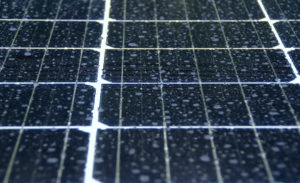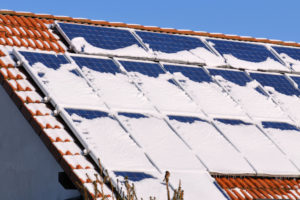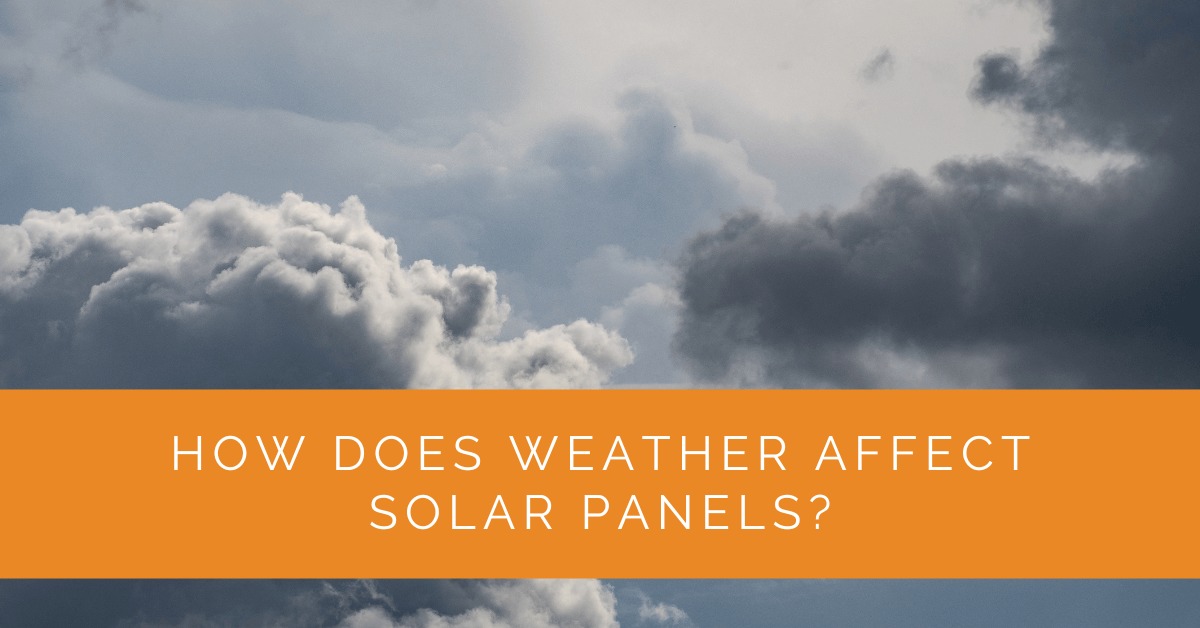Weather conditions play a significant role in the performance and efficiency of solar panels. Understanding the impact of weather on solar energy production is crucial for optimizing the benefits of renewable energy. In this article, we will explore in-depth how different weather conditions affect solar panels and what you can do to ensure optimal energy production throughout the year.
Contents
- 1 Key Takeaways
- 2 Weather Affecting Solar Panel Efficiency
- 3 Weather Affecting Solar Panel Longevity and Maintenance
- 4 Maximizing Solar Panel Performance in Different Weather Conditions
- 5 Case Study: Optimizing Solar Panel Performance in Varying Weather Conditions
- 6 Expert Insights From Our Solar Panel Installers About Weather’s Impact on Solar Panels
- 7 Experience Solar Excellence with Us!
- 8 Conclusion
Key Takeaways
- Weather conditions, such as sunlight intensity and extreme temperatures, significantly impact solar panels’ efficiency and energy production, with sunny days providing optimal output and overcast days leading to decreased performance.
- Hail, rain, and snow can affect the longevity of solar panels, requiring regular maintenance and prompt action to mitigate any damage caused by these weather events.
- Adapting to different weather conditions, such as optimizing panel efficiency, incorporating energy storage, and implementing preventive measures during extreme weather, is essential for maximizing solar panel performance and ensuring a consistent and reliable renewable energy supply.
Weather Affecting Solar Panel Efficiency
Solar panels thrive under specific weather conditions, while others can challenge their performance. Let’s take a closer look at how weather factors affect solar panel efficiency and energy production.
Sunny Days and Optimal Energy Production
Solar panels operate at their peak efficiency on clear, sunny days, harnessing abundant sunlight to generate electricity. The unobstructed sun rays provide an optimal environment for photovoltaic cells within the panels to convert solar energy into electrical energy. Solar panels can generate maximum power output during these ideal weather conditions, providing ample electricity for your needs.
Overcast Days and Decreased Energy Production
Cloudy or overcast days can significantly impact solar panel performance. With reduced direct sunlight, the amount of solar energy available for conversion decreases, resulting in lower energy production. However, it is important to note that solar panels can still produce electricity on cloudy days, albeit at a reduced capacity. This is because photovoltaic cells can capture diffused sunlight scattered by cloud cover. While the output may not be as high as on sunny days, solar panels can still contribute to your energy needs during overcast conditions.
Impact of Weather Conditions on Energy Production
Weather conditions beyond just sunlight intensity can affect solar panel efficiency. Extreme temperatures, whether too hot or too cold, can influence the performance of the photovoltaic cells, decreasing energy production. High temperatures can cause the panels to overheat, affecting their efficiency, while extremely cold temperatures can reduce the conductivity of the cells, limiting energy generation. Therefore, it is crucial to consider the impact of temperature variations when assessing solar panel performance.

Weather Affecting Solar Panel Longevity and Maintenance
While weather conditions can impact solar panel performance, they can also affect their longevity and maintenance requirements. Let’s explore how weather factors such as hail, rain, and snow can influence the durability and upkeep of solar panels.
Hail and Its Potential Impact
Hail is a weather phenomenon that can pose a risk to solar panels. While modern solar panels are designed to withstand certain levels of hail impact, severe hailstorms can cause damage to the panels. The impact can result in cracks or fractures in the glass surface, affecting the overall performance and longevity of the panels. Regular maintenance and inspections are crucial to promptly identifying and addressing any hail-related issues. You can promptly repair or replace damaged panels to ensure their continued functionality and optimal performance.
Rain and Snow: Considerations for Solar Panels
Rain and snow can have varying effects on solar panels. Rain, in general, does not have a significant impact on solar panel efficiency. However, dirt and debris can accumulate on the panels during heavy rain, reducing their overall performance. Regular cleaning and maintenance can help ensure that solar panels remain clean and free from any buildup that may hinder energy production.
On the other hand, accumulated snow can pose challenges to solar panel operation. When covered in snow, the panels cannot receive direct sunlight, hindering their ability to generate electricity. Removing snow from solar panels promptly is essential to restore their functionality. Various techniques, such as gently brushing off the snow or using specialized snow removal tools, can help keep the panels clear and maximize energy production during winter.

Maximizing Solar Panel Performance in Different Weather Conditions
Adapting to various weather conditions is essential to maximize the performance of solar panels throughout the year. By implementing system optimization and proactive maintenance strategies, you can ensure that your solar panel system performs optimally in different weather conditions.
Adapting to Cloudy Days
Consider optimizing your system for improved performance to make the most of solar panels during cloudy days. One approach is to use solar panels with higher efficiency ratings. These panels are designed to capture and convert sunlight more effectively, even in low-light conditions. Additionally, installing additional panels can compensate for the reduced output on cloudy days, increasing overall energy production.
Another strategy is incorporating energy storage systems, such as batteries, into your solar panel setup. These batteries can store excess energy generated during sunny days and release it when sunlight is limited, ensuring a consistent power supply during overcast periods. By harnessing and storing energy during optimal conditions, you can mitigate the impact of cloudy weather on your solar panel system’s performance.
Managing Extreme Weather Conditions
Extreme weather events like storms or hurricanes can pose risks to solar panel installations. Taking appropriate measures to protect your panels from potential damage and ensure their longevity is crucial.
During severe weather events, it is advisable to disconnect your solar panel system from the grid and shut it down. This precautionary step helps prevent any electrical surges or damage to the system in case of power fluctuations or lightning strikes. Additionally, reinforcing the structural integrity of your solar panels, such as using sturdy mounting systems, can enhance their ability to withstand strong winds and adverse weather conditions.
Regular inspections are vital to identify any issues caused by extreme weather. Conduct visual inspections of the panels, checking for visible damage or loose connections. Additionally, monitor the performance of your solar panel system before and after extreme weather events to ensure its functionality and efficiency.
Case Study: Optimizing Solar Panel Performance in Varying Weather Conditions
Background
At Solar Panels Network USA, we are dedicated to ensuring that our clients receive the maximum benefit from their solar panel installations, regardless of the weather conditions they face. This case study focuses on optimizing solar panel performance for a residential client in a region with diverse weather patterns, including sunny days, overcast conditions, and occasional extreme weather events.
Project Overview
Our client, located in a suburban area with variable weather conditions, sought a solution to ensure consistent energy production from their solar panels. The primary objectives were to optimize the system for different weather conditions, maintain high efficiency, and provide backup power during extreme weather events.
Implementation
System Design and Panel Selection
- Weather Analysis: We conducted a thorough analysis of the local weather patterns to understand the frequency of sunny, cloudy, and extreme weather days. This analysis helped us design a system tailored to the specific conditions of the region.
- Panel Selection: We selected high-efficiency photovoltaic panels known for their performance in low-light conditions. These panels were chosen to ensure optimal energy production even on cloudy days.
Energy Storage Integration
- Battery Storage: We integrated a lithium-ion battery storage system to capture excess energy generated during sunny days. This stored energy would be used during periods of low sunlight and during power outages, ensuring a continuous power supply.
- Energy Management System: An advanced energy management system was installed to monitor and optimize the flow of energy between the solar panels, battery storage, and household consumption. This system provided real-time data and performance analytics, allowing for efficient energy usage and storage.
Extreme Weather Adaptation
- Structural Reinforcements: To protect the solar panels from potential damage caused by hail and strong winds, we reinforced the mounting structures and used high-durability materials. This ensured that the panels could withstand extreme weather conditions without significant damage.
- Maintenance Plan: A regular maintenance plan was established, including biannual inspections and cleaning schedules. This plan ensured that the panels remained free from debris and any damage from hail or heavy rain was promptly addressed.
Results
Consistent Energy Production
- High Efficiency: The selected high-efficiency panels and optimized system design ensured consistent energy production, even on overcast days. The client reported a stable power supply throughout the year, with minimal fluctuations in energy output.
Resilience During Extreme Weather
- Backup Power: The integrated battery storage provided reliable backup power during grid outages, which were more common during stormy weather. This feature offered the client peace of mind and ensured the household remained powered during emergencies.
- Durability: The structural reinforcements and regular maintenance plan contributed to the longevity and durability of the solar panels. The client experienced minimal downtime and maintenance issues, even after severe weather events.
Economic and Environmental Benefits
- Cost Savings: The optimized energy production and efficient use of stored energy resulted in significant savings on electricity bills. The client anticipated a return on investment within a few years due to reduced reliance on the grid.
- Environmental Impact: By consistently harnessing solar energy, the client significantly reduced their carbon footprint, contributing to broader environmental sustainability goals.
Summary
This case study highlights the importance of optimizing solar panel systems to adapt to varying weather conditions. By selecting high-efficiency panels, integrating energy storage solutions, and implementing a proactive maintenance plan, we ensured that our client could maximize the benefits of solar energy throughout the year. Solar Panels Network USA remains committed to providing tailored solar solutions that meet the unique needs of each client, ensuring sustainable and reliable energy production regardless of weather challenges.
Expert Insights From Our Solar Panel Installers About Weather’s Impact on Solar Panels
Sunny days are ideal for solar panels, but it’s essential to remember that even on cloudy days, panels can still generate electricity, thanks to the diffused sunlight. The key is optimizing the system for varying light conditions.
Senior Solar Installer
Hail and heavy rain can pose risks to solar panels, but regular maintenance and inspections can mitigate damage. Ensuring the panels are clean and free from debris helps maintain efficiency and longevity.
Lead Renewable Energy Technician
Extreme temperatures, both hot and cold, can affect the performance of solar panels. Implementing proper ventilation and considering the placement of panels can help manage these temperature fluctuations.
Solar Energy Consultant
Experience Solar Excellence with Us!
Trust in Solar Panels Network USA, where our seasoned experts deliver top-quality solar solutions for homes and businesses nationwide. With a legacy of countless successful installations and a commitment to sustainable energy, we’re your reliable partner in the solar journey. Ready for a brighter, eco-friendly future? Call us now at (855) 427-0058 and harness the power of the sun!
Conclusion
Understanding how weather conditions affect solar panels is essential for optimizing energy production and maximizing the benefits of renewable energy. From the impact of sunlight intensity to the challenges posed by extreme weather, each weather factor plays a role in solar panels’ performance, longevity, and maintenance.
By adapting your system to different weather conditions, such as optimizing panel efficiency, implementing energy storage solutions, and taking preventive measures during extreme weather events, you can ensure that your solar panel system operates at its best throughout the year. Regular maintenance and inspections are key to promptly identifying and addressing any weather-related issues.
Embrace the power of solar energy and harness its potential, regardless of the weather conditions you may encounter. With proper understanding, adaptation, and maintenance, your solar panel system will continue providing sustainable and clean energy for years.
About the Author
Solar Panels Network USA stands at the forefront of solar energy solutions, driven by a team of seasoned solar engineers and energy consultants. With over decades of experience in delivering high-quality solar installations and maintenance, we are committed to promoting sustainable energy through customer-centric, tailored solutions. Our articles reflect this commitment, crafted collaboratively by experts to provide accurate, up-to-date insights into solar technology, ensuring our readers are well-informed and empowered in their solar energy decisions.

